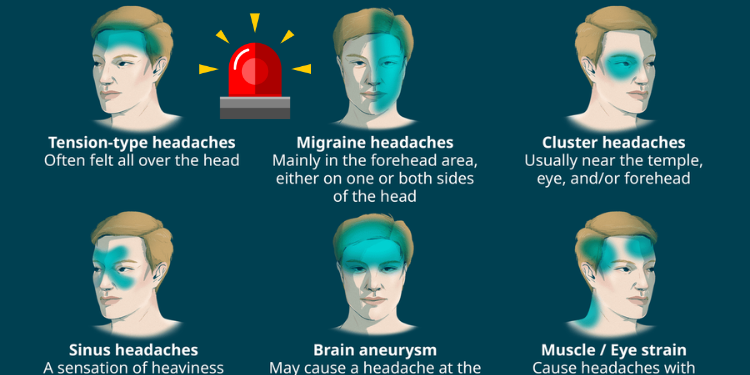Headaches are one of those universal experiences—annoying, sometimes debilitating, and often brushed off as “just stress” or “not enough coffee.”
But what if that throbbing in your temples or the dull ache behind your eyes is trying to tell you something more?
Far from being random, headaches can act like a health dashboard, flashing warning lights about what’s going on inside your body.
Here’s a breakdown of what different types of headaches might reveal about your well-being—and when it’s time to pay attention.
The Tension Headache: Stress Is Taking Over
If you feel a tight band squeezing your head, like a too-small hat, you’re likely dealing with a tension headache.
This is the most common type, often triggered by stress, poor posture, or clenched jaws from grinding your teeth. What it’s saying? Your body’s begging for a break.
Chronic stress can spike cortisol levels, leaving your muscles tense and your head pounding. Next time, try stretching, deep breathing, or a quick shoulder rub before reaching for the painkillers.
The Migraine: More Than Just a Headache
Migraines are the heavy hitters—intense, throbbing pain often on one side of the head, sometimes paired with nausea, light sensitivity, or even strange visual “auras.”
These aren’t just headaches; they’re neurological events. They might signal hormonal shifts (hello, menstruation or menopause), food triggers (like aged cheese or MSG), or even sleep disruptions.
For some, migraines hint at deeper issues like high blood pressure or inflammation. If they’re frequent, a doctor’s visit might uncover the root cause.
The Cluster Headache: A Red Flag for Oxygen or Nerves
Ever feel a piercing, burning pain around one eye, like someone’s stabbing you with an ice pick? That’s a cluster headache—rare, brutal, and often striking in cycles. These can point to issues with blood vessels or oxygen flow in the brain.
They’re more common in men and sometimes linked to smoking or alcohol. If you’re waking up with these at night, it’s worth checking in with a specialist—your body’s sounding an alarm.
The Sinus Headache: Congestion’s Calling Card
A deep, constant ache across your forehead, cheeks, or nose? That’s likely a sinus headache, tied to inflammation or infection in your sinus cavities. It might mean allergies are flaring, a cold’s brewing, or a sinus infection’s taken hold.
If it’s paired with a stuffy nose or fever, your immune system’s waving a flag. Steam, hydration, or a saline rinse might clear it up—but if it lingers, antibiotics could be needed.
The Dehydration Headache: Your Body’s Thirsty
Feel a dull throb that gets worse when you move? If you’ve skimped on water or sweat too much, dehydration might be the culprit.
Your brain literally shrinks slightly when fluids are low, tugging on its protective layers and sparking pain.
The fix? Guzzle some water and watch it fade. It’s a simple reminder: your body needs H2O to run smoothly.
The Caffeine Headache: Withdrawal or Overload
Love your morning coffee but feel a pounding head when you skip it? That’s caffeine withdrawal—your brain’s blood vessels dilating after getting used to the constriction caffeine causes.
On the flip side, too much caffeine can also trigger headaches by overstimulating your system. It’s your body saying, “Find a balance!” Ease off gradually or cut back if you’re overdoing it.
When to Worry: The Red Flags
Most headaches are benign, but some scream for attention.
If yours comes on like a thunderclap (sudden and severe), pairs with confusion, vision loss, or a stiff neck, or follows a head injury, it could point to something serious—think aneurysm, stroke, or meningitis.
Don’t wait; get medical help fast.
Listening to Your Head
Headaches aren’t just pain—they’re messengers. By tuning into where they hit, how they feel, and what’s happening in your life, you can decode their signals.
Stress, hydration, diet, sleep, even your posture—all play a role.
So next time your head aches, don’t just pop a pill and move on. Ask yourself: What’s my body trying to tell me?
A little detective work might save you more than just a headache down the road.

